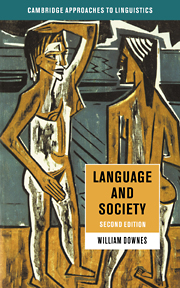Book contents
- Frontmatter
- Contents
- Acknowledgements
- 1 Linguistics and sociolinguistics
- 2 A tapestry in space and time
- 3 Language varieties: processes and problems
- 4 Discovering the structure in variation
- 5 Rhoticity
- 6 At the intersection of social factors
- 7 Change, meaning and acts of identity
- 8 The discourse of social life
- 9 Communication: words and world
- 10 Action and critique
- 11 Language and social explanation
- Further reading
- References
- Index
4 - Discovering the structure in variation
Published online by Cambridge University Press: 05 June 2012
- Frontmatter
- Contents
- Acknowledgements
- 1 Linguistics and sociolinguistics
- 2 A tapestry in space and time
- 3 Language varieties: processes and problems
- 4 Discovering the structure in variation
- 5 Rhoticity
- 6 At the intersection of social factors
- 7 Change, meaning and acts of identity
- 8 The discourse of social life
- 9 Communication: words and world
- 10 Action and critique
- 11 Language and social explanation
- Further reading
- References
- Index
Summary
‘Free variation’ is of course a label, not an explanation. It does not tell us where the variants came from nor why the speakers use them in differing proportions, but is rather a way of excluding such questions from the scope of immediate inquiry.
Fischer (1958)Variability
In the last chapter, we looked at code-switching and saw that sometimes it was not plausible to account for variation as an alternation between two distinct codes. Sometimes we find instead a rapid and seemingly random fluctuation between linguistic forms. Let us make this problem concrete, so we can visualize what such variation is like. Consider words ending in the suffix ‘-ing’, such as ‘hunting’ or ‘working’. Very widely within the English-speaking world, people pronounce such items as either working or workin'. Sometimes the suffix is pronounced as ‘-ing’; sometimes as ‘-in’. Although from the point of view of the written word, this looks like ‘dropping the g’, that is not what happens. Phonetically neither form of the suffix contains [g]; the contrast is between whether the final nasal is pronounced at the back, [iŋ], or the front, [in], of the mouth.
To imagine the variability here, let the /in/ form be represented by 1 and the /iŋ/ form by 0. Now imagine utterances by three speakers on a given occasion where there are ten opportunities of pronouncing words which have the ‘-ing’ suffix.
- Type
- Chapter
- Information
- Language and Society , pp. 93 - 132Publisher: Cambridge University PressPrint publication year: 1998

